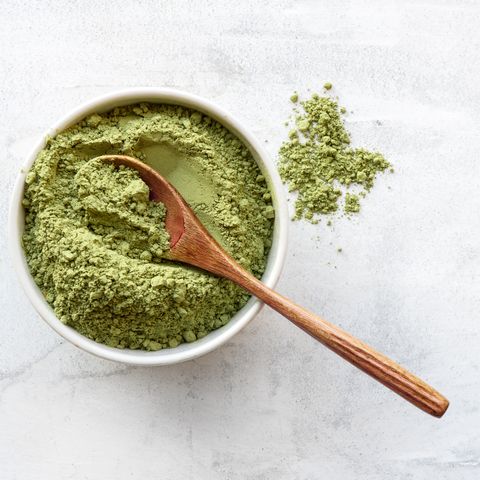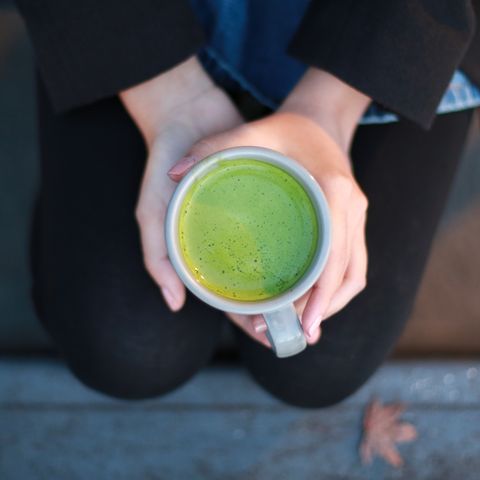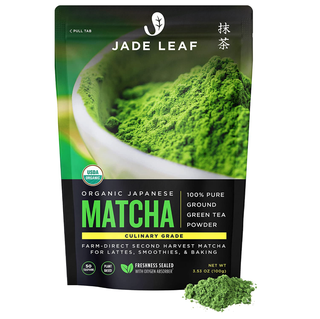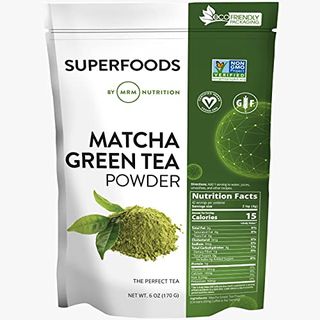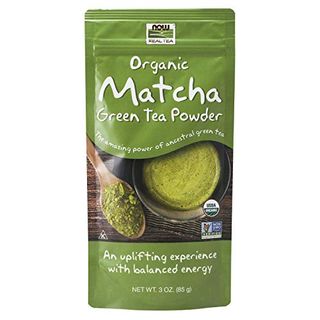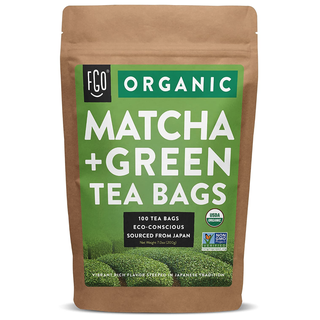Vibrant green matcha has quickly become synonymous with the wellness industry due to its robust nutritional profile — helping it earn a health halo in the beverage aisle and in coffee and tea shops across the globe. As a beverage category, health experts have already lauded tea as better for you compared to caffeine-heavy coffee or sugary energy drinks. But matcha, in particular, takes that healthy edge to a new level, as this bright green tea is much more well-rounded in nature, explains Amy Fischer, MS, RDN, CDN, a registered dietitian within the Good Housekeeping Institute‘s Nutrition Lab.
Unlike traditional tea bags that are removed after steeping, matcha is made from a powder derived from whole tea leaves, which you consume entirely when drinking. While both green tea and matcha tea come from the same plant, this brewing method instantly translates to a significant increase of antioxidants in each cup you brew, Fischer adds, which may help to lower the risk of disease and chronic inflammation over time.
While nutritional benefits can exist across the board, not all matcha is the same — in fact, matcha has its own full, rich cultural history that dates back to as early as the 7th century in Japan, per materials distributed by Michigan State University. American matcha tea beverages and subsequent tea products can be prepared, presented and enjoyed in extremely different ways compared to more traditional applications.
To ensure you’re enjoying the healthiest matcha teas that retain full nutritional value, try to source powders and other products that display a full amount of catechins (often Epigallocatechin gallate, known as EGCG), according to analysts at ConsumerLab.com.
Fischer says a minimum of 40mg to 100mg of EGCG per serving is something you should aim for; 200-300mg of EGCG may be the best quality matcha powder to reap the most benefits, she adds.
What health benefits are associated with matcha tea?
This vivid form of green tea gleans all of its health benefits from the powder that’s used to brew it, lending a savory, umami flavor profile harvested from tea leaves that are often specially farmed for this particular use.
Most traditional matcha powder comes from green tea leaves that are grown in tarped, shaded tea fields, a special practice that allows the leaf to retain more nutritional value, including optimal catechins and the amino acid L-Theanine, as noted in the same materials highlighted by Michigan State University educators. Read on to learn about distinct benefits associated with matcha powder and brewed teas.
Editor’s Note: This article contains discussion of weight loss, and mentions calories, pounds and/or other terms and external measures that people trying to recover from disordered eating or eating disorders may be seeking to avoid.
1) Matcha powder is rich in antioxidants
Antioxidants sourced through natural dietary choices can help offset disease risk and help to limit inflammation across the board, Fischer says. And a good dose of matcha is “one of the richest antioxidant sources naturally available,” according to a 2021 scholarly study review. Matcha powder contains a high amount of antioxidants known as catechins and another group referred to as polyphenols, both of which play a key role in a balanced diet.
“Matcha is high in antioxidants such as L-theanine, chlorophyll and polyphenols known as catechins,” Fischer says. “The catechin found in the greatest amount in [this form of] green tea is epigallocatechin-3-gallate, or EGCG, which has been shown in research to have anti-inflammatory benefits with no severe adverse effects.”
2) Pure matcha tea is packed with essential vitamins
Nutritional reviews of matcha powder indicate that this form of refined, crushed green tea leaves retain a significant amount of nutrients, particularly vitamin A and vitamin C, among others. The same Molecules journal review found that matcha tea, depending on its temperature and how it’s prepared, was found to have “more than double the amount of vitamin C of other green teas.”
Primarily, the vitamin C traced back to matcha can play a protective role in skin health (more on that later) — but its potent source of vitamin C may also help regulate your immune system to be in tip-top shape, especially when it’s consumed regularly. A 2013 study suggests that additions like milk or cream into green tea can reduce the absorption of catechins and other nutrients you’d normally enjoy. If you’re looking to cut the powerful flavor of a matcha tea, try adding fresh lemon; research published in Antioxidants in 2019 indicates lemon juice in green tea may help you better absorb these crucial nutrients.
3) Matcha powder contains amino acids that may boost brain health
Exclusively associated with tea, L-theanine is an amino acid that is readily found in green tea, Fischer explains — and is the only dietary source of this particular amino acid you can incorporate. There is a suite of well-supported studies which show this particular component of matcha may help protect and even potentially enhance your brain function and cognitive health as you age.
A 2021 Journal of Medicinal Food study illustrates that this particular amino acid can contribute to improved working memory skills over time, and may even tie in to “executive function and attention,” Fischer adds. Tied in with a 2017 study that suggests the combo of L-theanine and caffeine improves cognition and brain function, many experts find L-theanine worth continued study for its natural role in the prevention of memory decline. More research is certainly needed, in any case.
“Some studies have previously linked consumption of green tea with increased cognitive performance, but the majority of current results have ended up being mostly inconclusive,” Fischer explains. “A 2020 study examined matcha green tea powder consumption and memory function alongside impulsivity in the elderly; the study indicated that supplementation with matcha may help prevent cognitive decline in elderly women, though more research is needed.”
New research will continue to build on matcha green tea’s potential for cognition, finding more definitive ties that may influence how healthcare providers regard the beverage; in a similar vein to this small 2014 controlled study that suggested just 2g of matcha powder consumed daily over the course of 2 months had a direct correlation in improved recorded brain function in elderly individuals.
4) Matcha tea is highly caffeinated, but combats jitteriness
The caffeine content within matcha definitely contributes to its signature flavor and taste when it’s brewed as a tea. But the primary amino acid found within its powder, L-theanine, can “counteract the effects of caffeine,” Fischer explains. In fact, data shared in a 2019 issue of the journal Nutrients suggested that L-theanine within matcha achieves this effect in part by helping to activate dopamine and serotonin production in the body, all of which links back to your overall mood.
Most matcha powders contain upwards of three times the amount of caffeine compared to regular green tea — and third overall of the amount found in regular black coffee — making it a good option for a morning pick-me-up that won’t lead to as big of a crash or afternoon slump. The gentle spark of energy and alertness can be enjoyed throughout a work routine as many people can safely enjoy multiple cups of this beverage in a single day.
The caffeine content in matcha powder can vary from product to product, as factors like the age of the leaves harvested and your chosen brewing method can impact its potency, Fisher explains. But rest assured that if you choose to swap tea for coffee, matcha is much more likely to be the most caffeinated source of tea you can find.
5) Matcha may play a small role in cancer prevention
While research in this area isn’t as substantiated as others and needs further review, Fischer says there have been individual studies that suggest that green tea consumption could be linked to reduced risk of multiple forms of cancers. One of the best indicators of this link for matcha specifically is a 2018 analysis published in Carcinogenesis which illustrated regular tea consumption could be associated with a reduced risk of ovarian cancer.
The reason matcha and green tea, in general, may play a role in lowering cancer risk is due to the amount of EGCG it contains, the catechin that is usually linked to anti-cancer benefits in a myriad of studies. One such study that indicates the promise of EGCG in this realm was published in 2001, having been limited in that it focuses solely on rats, but noted that green tea extract decreased the tumor size and growth of breast cancer cells specifically.
6) Matcha may help boost heart health over time
There are numerous studies that point to a cholesterol-busting effect associated with green tea consumption, although many are limited in nature. A recent systematic review of existing research published in Nutrition Journal suggests there’s an association with drinking green tea (matcha included) regularly and a subsequent lowering of LDL cholesterol, but a stagnant effect in HDL cholesterol.
Previous research indicates that drinking green tea regularly can be associated with a reduced risk of heart disease and stroke in the long run. Findings like these may be colored by the fact that those who tend to drink matcha tea regularly may also choose other heart-healthy lifestyle choices, namely in their dietary routine.
“The findings of the review indicate that more research is needed to make definitive conclusions,” Fischer says.
7) Drinking matcha tea regularly is linked to healthy, glowing skin
Vitamin C has long been linked to optimal skin health in multiple uses, including topical application — but matcha tea’s high vitamin C content has also been noted to stimulate healthy skin growth. A 2017 Nutrients study indicated that vitamin C may directly stimulate collagen production, which is key to healthy skin regulation. Plus, other essential nutrients within matcha powder can assist in providing this holistic wellness benefit, Fischer says.
“A recent study review indicated that green tea may improve skin affected by photoaging, or detrimental effects from sun exposure,” she explains. “Green tea consumption was shown to have potential anti-wrinkle effects and provide collagen boosting properties.”
When applied to skin before UV exposure, the polyphenols found within green tea were shown to decrease sunburn cells and protect against any redness or DNA damage, Fischer adds, with other health experts concluding it may provide the same effect through consumption.
8) Matcha tea may assist in weight management
Although highly contested among nutrition authorities, there are numerous studies that attempt to draw a connection between green tea and weight management efforts, particularly through a sustained effect on metabolism.
Many proponents of using green tea (and subsequently matcha, given that they are derived from the same plant) for weight loss efforts point to a 2009 review of 11 different studies that suggests green tea consumption worked for sustained weight loss; there’s also a small peer-reviewed study that suggests green tea extract during exercise improved fat-burning efforts by upwards of 17%.
The real reason green tea and matcha tea may be linked to weight management could be due to their improved nutritional profile over other options like soda or sugary energy drinks.
“Some research that looked at green tea and weight loss historically indicated modest weight loss, of which wasn’t considered clinically significant,” Fischer says. “The weight loss was also thought to be more associated with the caffeine found in green tea, since caffeine can reduce appetite in some people.”
Is it okay to drink matcha tea daily?
After hearing more about the entire suite of holistic health benefits associated with matcha powder, you may be wondering — should I make matcha tea my daily beverage of choice over other caffeinated options? If you’re on the hunt for a morning coffee substitute or even an afternoon pick-me-up, Fischer says that pure matcha tea prepared in your kitchen is an excellent swap.
More often than not, matcha tea is considered to be more caffeinated than regular green tea and many other teas available, as its powder is derived from whole tea leaves that are mixed into brewed beverages, Fischer adds. This special distinction makes it a better candidate for someone who needs a controlled energy boost in the morning without having to turn to coffee.
“Both matcha and green tea contain an amino acid, L-theanine, which is known for its calming effect and its potential role in counteracting any caffeine ‘jitters’,” she adds. “[Matcha tea] is then a potentially better choice, than coffee, for example, for individuals that are caffeine sensitive.”
Recent research backs a 2012 study that suggests consuming anywhere from three to five cups of matcha tea per day — around 300mg of EGCG in total — may have the best impact on your overall health, Fischer says.
This content is created and maintained by a third party, and imported onto this page to help users provide their email addresses. You may be able to find more information about this and similar content at piano.io

